Challenges and Strategies for Ekta's Transition in Nursing Practice
VerifiedAdded on 2023/01/10
|7
|2381
|54
Essay
AI Summary
This essay examines the professional transition of Ekta, a graduate registered nurse in a paediatric oncology unit. It addresses her challenges, including dealing with sensitive parents and medication administration procedures. The essay emphasizes the importance of intra-professional communication, particularly teamwork and team leadership, within nursing teams in a paediatric oncology setting. It then develops and discusses strategies for Ekta to address these concerns, such as critical reflection, person-centered care, and training. The analysis draws on relevant literature to support the strategies, contextualizing the issues within professional nursing practice. The essay aims to provide insights into successful transition processes for nurses in clinical practice.
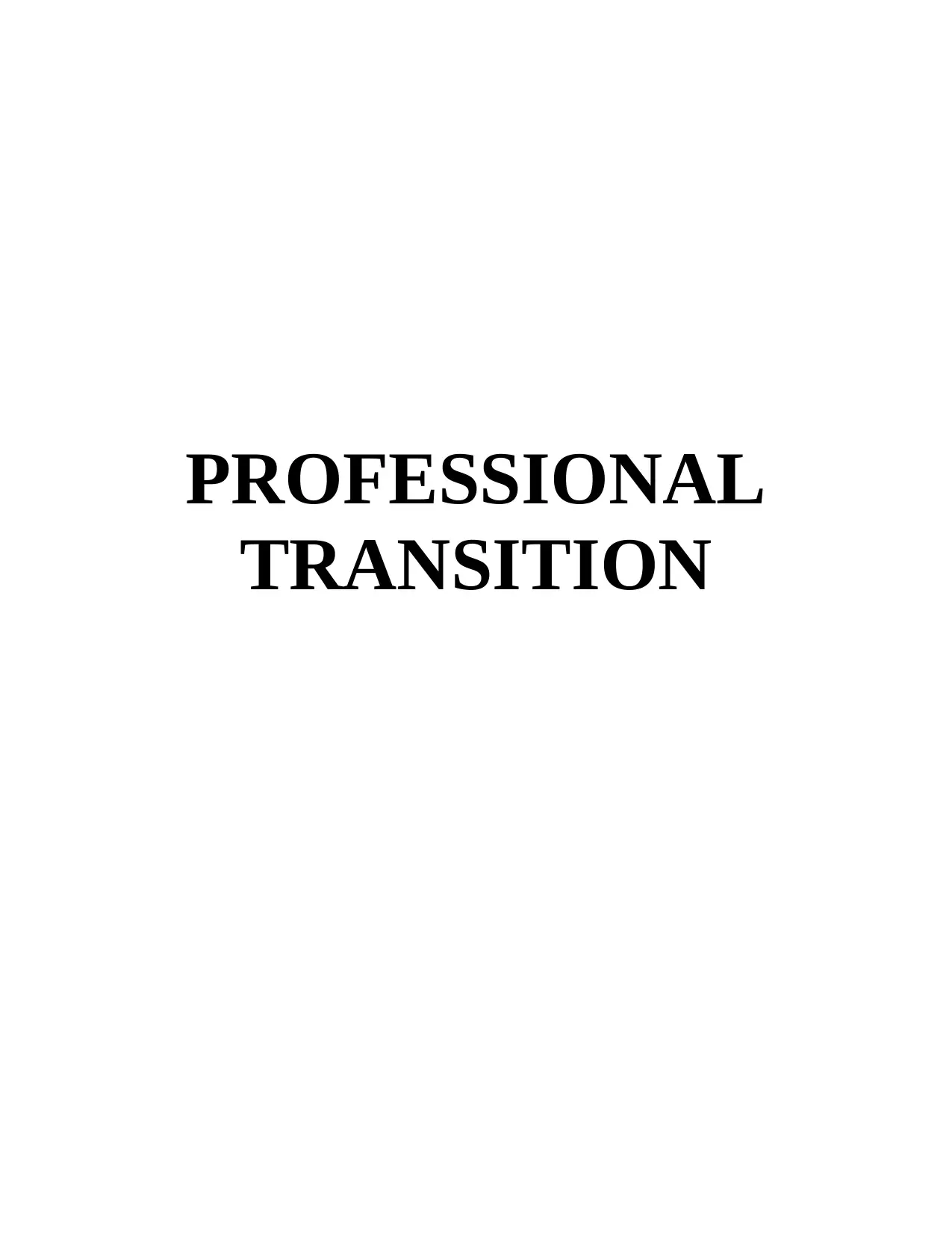
PROFESSIONAL
TRANSITION
TRANSITION
Paraphrase This Document
Need a fresh take? Get an instant paraphrase of this document with our AI Paraphraser
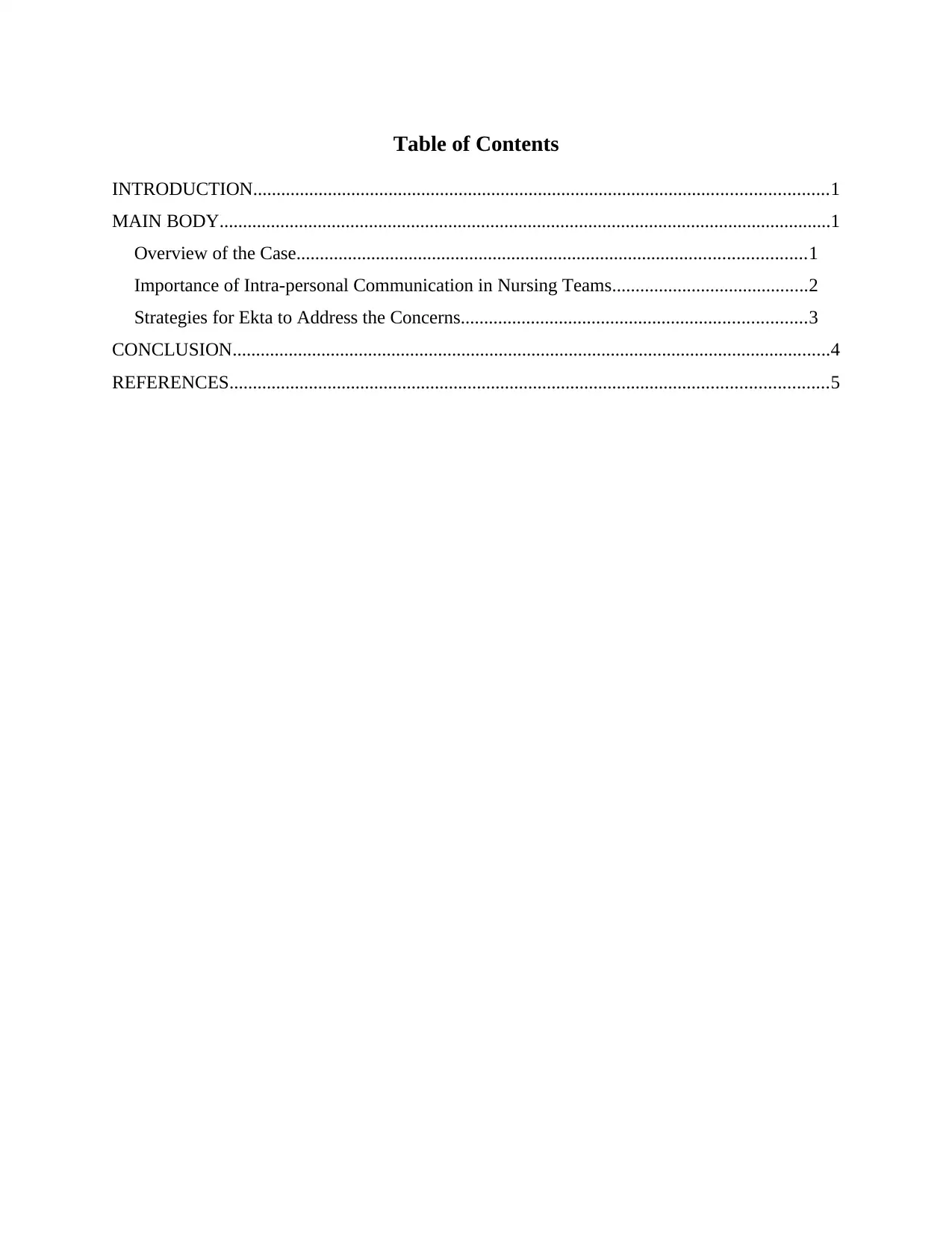
Table of Contents
INTRODUCTION...........................................................................................................................1
MAIN BODY...................................................................................................................................1
Overview of the Case.............................................................................................................1
Importance of Intra-personal Communication in Nursing Teams..........................................2
Strategies for Ekta to Address the Concerns..........................................................................3
CONCLUSION................................................................................................................................4
REFERENCES................................................................................................................................5
INTRODUCTION...........................................................................................................................1
MAIN BODY...................................................................................................................................1
Overview of the Case.............................................................................................................1
Importance of Intra-personal Communication in Nursing Teams..........................................2
Strategies for Ekta to Address the Concerns..........................................................................3
CONCLUSION................................................................................................................................4
REFERENCES................................................................................................................................5
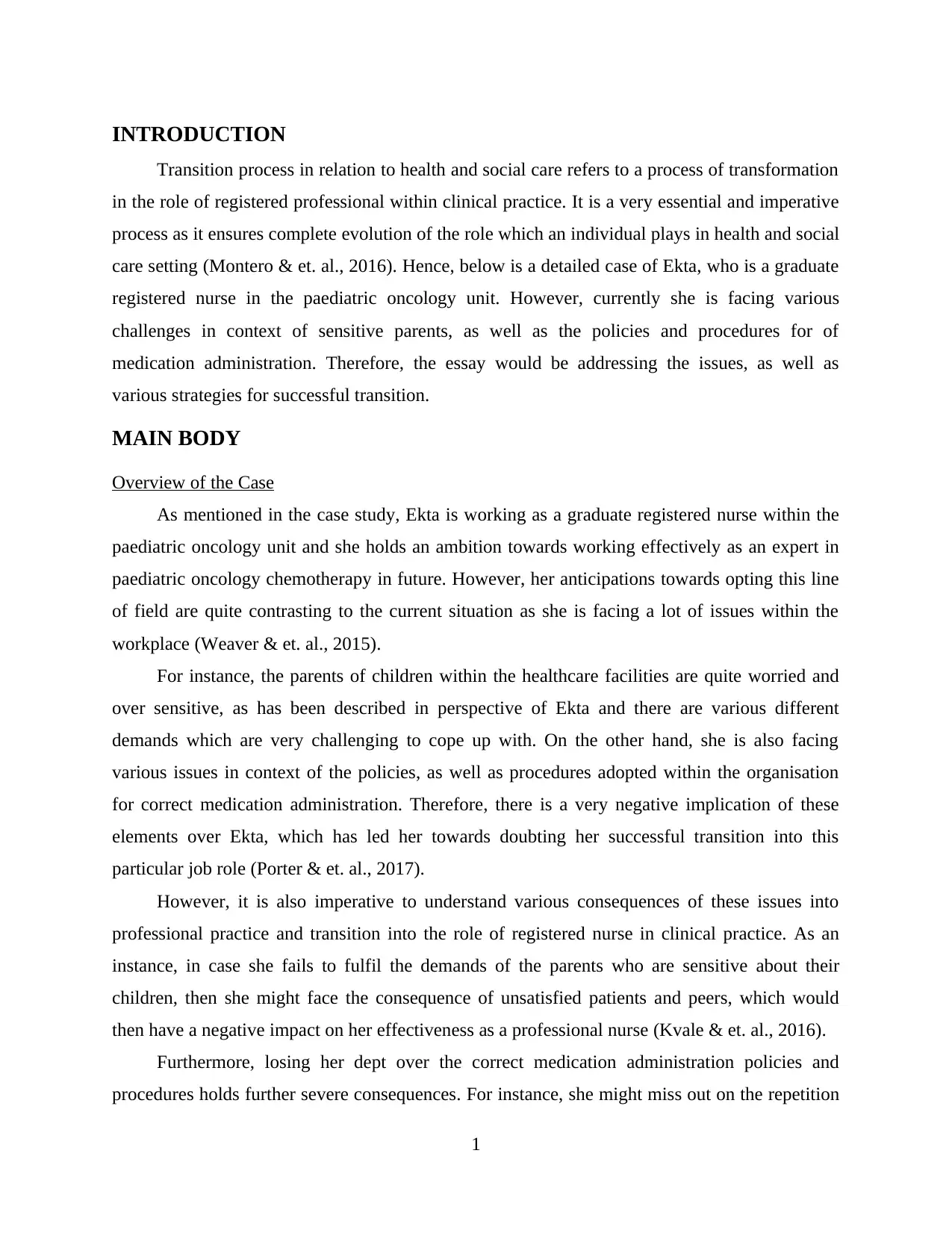
INTRODUCTION
Transition process in relation to health and social care refers to a process of transformation
in the role of registered professional within clinical practice. It is a very essential and imperative
process as it ensures complete evolution of the role which an individual plays in health and social
care setting (Montero & et. al., 2016). Hence, below is a detailed case of Ekta, who is a graduate
registered nurse in the paediatric oncology unit. However, currently she is facing various
challenges in context of sensitive parents, as well as the policies and procedures for of
medication administration. Therefore, the essay would be addressing the issues, as well as
various strategies for successful transition.
MAIN BODY
Overview of the Case
As mentioned in the case study, Ekta is working as a graduate registered nurse within the
paediatric oncology unit and she holds an ambition towards working effectively as an expert in
paediatric oncology chemotherapy in future. However, her anticipations towards opting this line
of field are quite contrasting to the current situation as she is facing a lot of issues within the
workplace (Weaver & et. al., 2015).
For instance, the parents of children within the healthcare facilities are quite worried and
over sensitive, as has been described in perspective of Ekta and there are various different
demands which are very challenging to cope up with. On the other hand, she is also facing
various issues in context of the policies, as well as procedures adopted within the organisation
for correct medication administration. Therefore, there is a very negative implication of these
elements over Ekta, which has led her towards doubting her successful transition into this
particular job role (Porter & et. al., 2017).
However, it is also imperative to understand various consequences of these issues into
professional practice and transition into the role of registered nurse in clinical practice. As an
instance, in case she fails to fulfil the demands of the parents who are sensitive about their
children, then she might face the consequence of unsatisfied patients and peers, which would
then have a negative impact on her effectiveness as a professional nurse (Kvale & et. al., 2016).
Furthermore, losing her dept over the correct medication administration policies and
procedures holds further severe consequences. For instance, she might miss out on the repetition
1
Transition process in relation to health and social care refers to a process of transformation
in the role of registered professional within clinical practice. It is a very essential and imperative
process as it ensures complete evolution of the role which an individual plays in health and social
care setting (Montero & et. al., 2016). Hence, below is a detailed case of Ekta, who is a graduate
registered nurse in the paediatric oncology unit. However, currently she is facing various
challenges in context of sensitive parents, as well as the policies and procedures for of
medication administration. Therefore, the essay would be addressing the issues, as well as
various strategies for successful transition.
MAIN BODY
Overview of the Case
As mentioned in the case study, Ekta is working as a graduate registered nurse within the
paediatric oncology unit and she holds an ambition towards working effectively as an expert in
paediatric oncology chemotherapy in future. However, her anticipations towards opting this line
of field are quite contrasting to the current situation as she is facing a lot of issues within the
workplace (Weaver & et. al., 2015).
For instance, the parents of children within the healthcare facilities are quite worried and
over sensitive, as has been described in perspective of Ekta and there are various different
demands which are very challenging to cope up with. On the other hand, she is also facing
various issues in context of the policies, as well as procedures adopted within the organisation
for correct medication administration. Therefore, there is a very negative implication of these
elements over Ekta, which has led her towards doubting her successful transition into this
particular job role (Porter & et. al., 2017).
However, it is also imperative to understand various consequences of these issues into
professional practice and transition into the role of registered nurse in clinical practice. As an
instance, in case she fails to fulfil the demands of the parents who are sensitive about their
children, then she might face the consequence of unsatisfied patients and peers, which would
then have a negative impact on her effectiveness as a professional nurse (Kvale & et. al., 2016).
Furthermore, losing her dept over the correct medication administration policies and
procedures holds further severe consequences. For instance, she might miss out on the repetition
1
⊘ This is a preview!⊘
Do you want full access?
Subscribe today to unlock all pages.

Trusted by 1+ million students worldwide
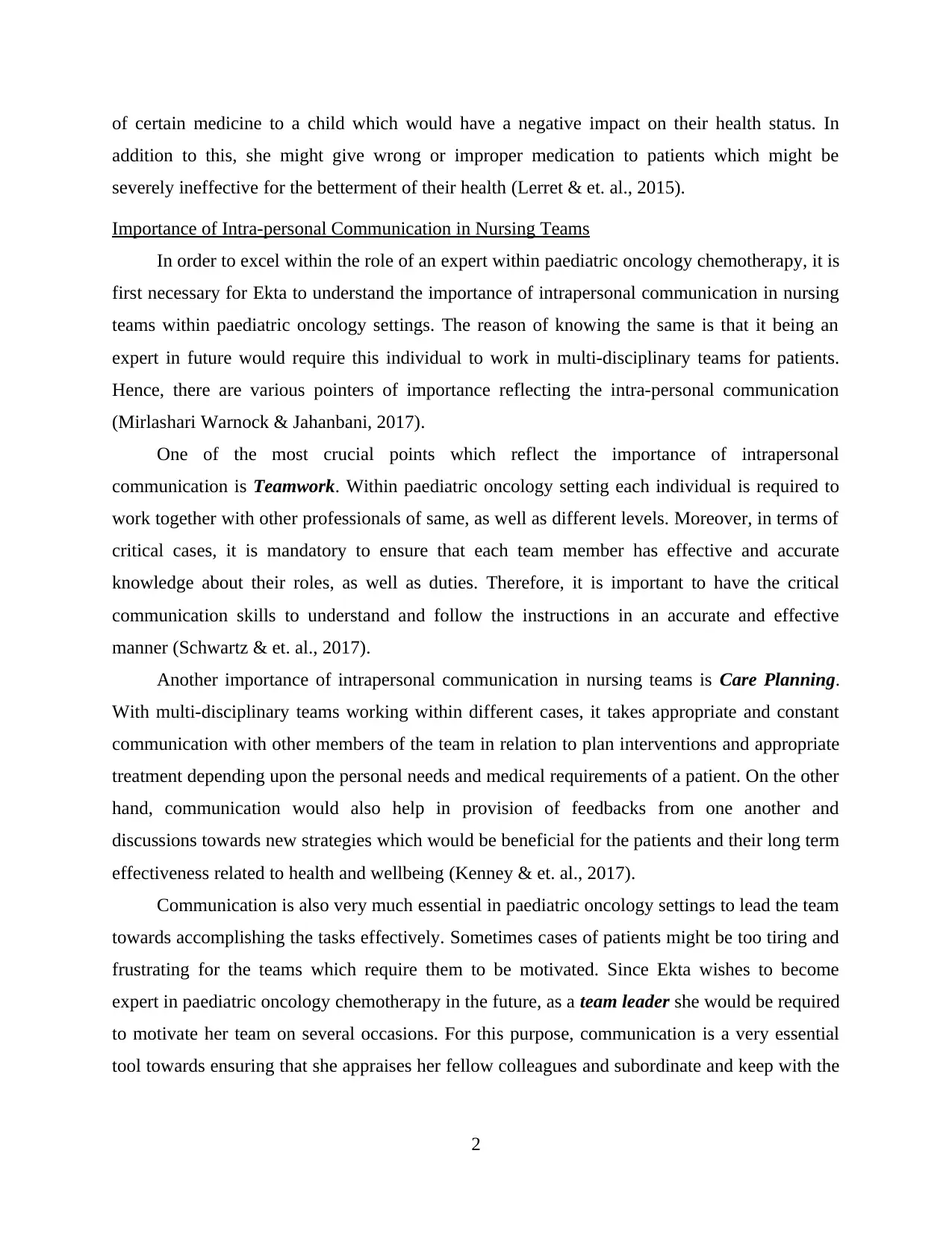
of certain medicine to a child which would have a negative impact on their health status. In
addition to this, she might give wrong or improper medication to patients which might be
severely ineffective for the betterment of their health (Lerret & et. al., 2015).
Importance of Intra-personal Communication in Nursing Teams
In order to excel within the role of an expert within paediatric oncology chemotherapy, it is
first necessary for Ekta to understand the importance of intrapersonal communication in nursing
teams within paediatric oncology settings. The reason of knowing the same is that it being an
expert in future would require this individual to work in multi-disciplinary teams for patients.
Hence, there are various pointers of importance reflecting the intra-personal communication
(Mirlashari Warnock & Jahanbani, 2017).
One of the most crucial points which reflect the importance of intrapersonal
communication is Teamwork. Within paediatric oncology setting each individual is required to
work together with other professionals of same, as well as different levels. Moreover, in terms of
critical cases, it is mandatory to ensure that each team member has effective and accurate
knowledge about their roles, as well as duties. Therefore, it is important to have the critical
communication skills to understand and follow the instructions in an accurate and effective
manner (Schwartz & et. al., 2017).
Another importance of intrapersonal communication in nursing teams is Care Planning.
With multi-disciplinary teams working within different cases, it takes appropriate and constant
communication with other members of the team in relation to plan interventions and appropriate
treatment depending upon the personal needs and medical requirements of a patient. On the other
hand, communication would also help in provision of feedbacks from one another and
discussions towards new strategies which would be beneficial for the patients and their long term
effectiveness related to health and wellbeing (Kenney & et. al., 2017).
Communication is also very much essential in paediatric oncology settings to lead the team
towards accomplishing the tasks effectively. Sometimes cases of patients might be too tiring and
frustrating for the teams which require them to be motivated. Since Ekta wishes to become
expert in paediatric oncology chemotherapy in the future, as a team leader she would be required
to motivate her team on several occasions. For this purpose, communication is a very essential
tool towards ensuring that she appraises her fellow colleagues and subordinate and keep with the
2
addition to this, she might give wrong or improper medication to patients which might be
severely ineffective for the betterment of their health (Lerret & et. al., 2015).
Importance of Intra-personal Communication in Nursing Teams
In order to excel within the role of an expert within paediatric oncology chemotherapy, it is
first necessary for Ekta to understand the importance of intrapersonal communication in nursing
teams within paediatric oncology settings. The reason of knowing the same is that it being an
expert in future would require this individual to work in multi-disciplinary teams for patients.
Hence, there are various pointers of importance reflecting the intra-personal communication
(Mirlashari Warnock & Jahanbani, 2017).
One of the most crucial points which reflect the importance of intrapersonal
communication is Teamwork. Within paediatric oncology setting each individual is required to
work together with other professionals of same, as well as different levels. Moreover, in terms of
critical cases, it is mandatory to ensure that each team member has effective and accurate
knowledge about their roles, as well as duties. Therefore, it is important to have the critical
communication skills to understand and follow the instructions in an accurate and effective
manner (Schwartz & et. al., 2017).
Another importance of intrapersonal communication in nursing teams is Care Planning.
With multi-disciplinary teams working within different cases, it takes appropriate and constant
communication with other members of the team in relation to plan interventions and appropriate
treatment depending upon the personal needs and medical requirements of a patient. On the other
hand, communication would also help in provision of feedbacks from one another and
discussions towards new strategies which would be beneficial for the patients and their long term
effectiveness related to health and wellbeing (Kenney & et. al., 2017).
Communication is also very much essential in paediatric oncology settings to lead the team
towards accomplishing the tasks effectively. Sometimes cases of patients might be too tiring and
frustrating for the teams which require them to be motivated. Since Ekta wishes to become
expert in paediatric oncology chemotherapy in the future, as a team leader she would be required
to motivate her team on several occasions. For this purpose, communication is a very essential
tool towards ensuring that she appraises her fellow colleagues and subordinate and keep with the
2
Paraphrase This Document
Need a fresh take? Get an instant paraphrase of this document with our AI Paraphraser
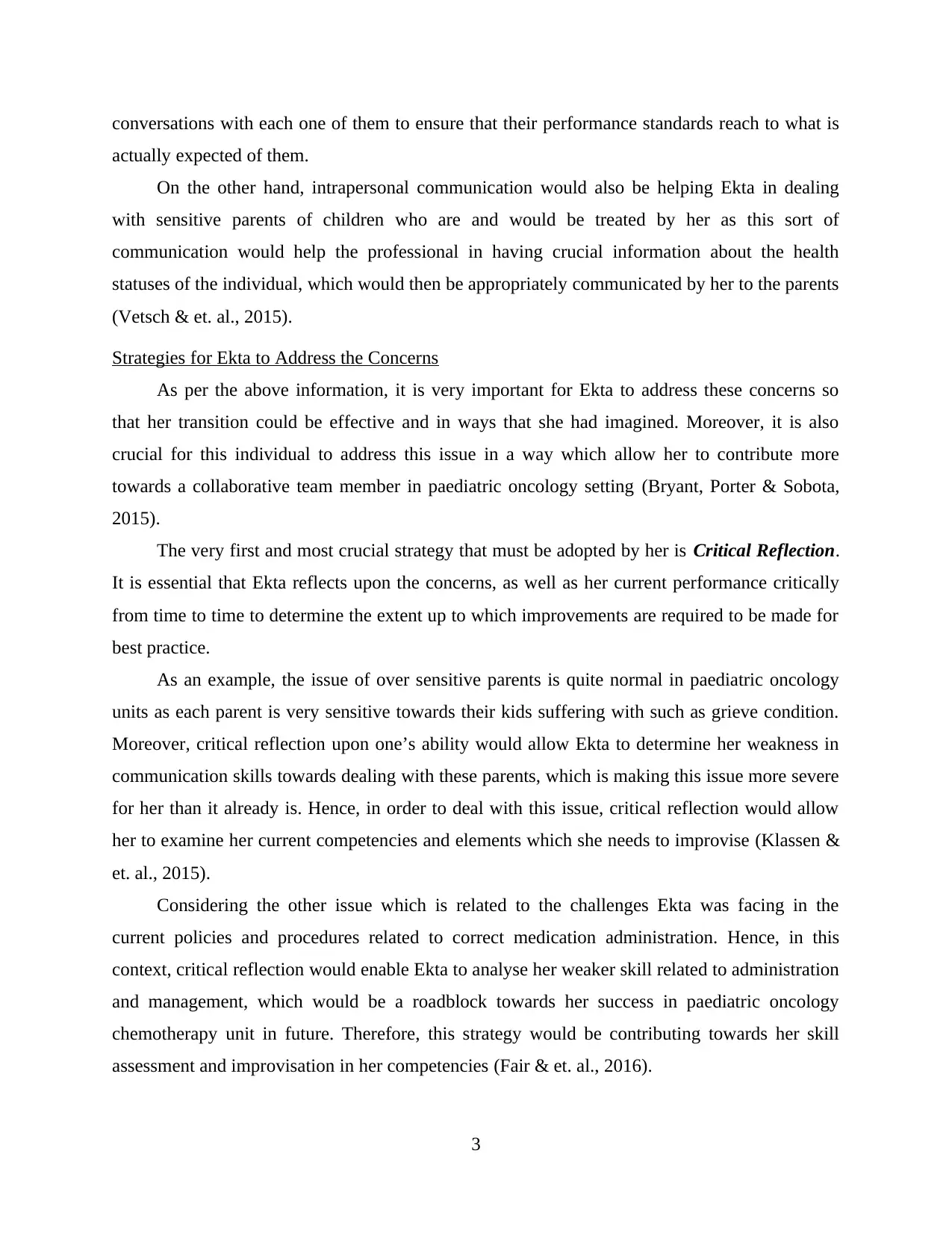
conversations with each one of them to ensure that their performance standards reach to what is
actually expected of them.
On the other hand, intrapersonal communication would also be helping Ekta in dealing
with sensitive parents of children who are and would be treated by her as this sort of
communication would help the professional in having crucial information about the health
statuses of the individual, which would then be appropriately communicated by her to the parents
(Vetsch & et. al., 2015).
Strategies for Ekta to Address the Concerns
As per the above information, it is very important for Ekta to address these concerns so
that her transition could be effective and in ways that she had imagined. Moreover, it is also
crucial for this individual to address this issue in a way which allow her to contribute more
towards a collaborative team member in paediatric oncology setting (Bryant, Porter & Sobota,
2015).
The very first and most crucial strategy that must be adopted by her is Critical Reflection.
It is essential that Ekta reflects upon the concerns, as well as her current performance critically
from time to time to determine the extent up to which improvements are required to be made for
best practice.
As an example, the issue of over sensitive parents is quite normal in paediatric oncology
units as each parent is very sensitive towards their kids suffering with such as grieve condition.
Moreover, critical reflection upon one’s ability would allow Ekta to determine her weakness in
communication skills towards dealing with these parents, which is making this issue more severe
for her than it already is. Hence, in order to deal with this issue, critical reflection would allow
her to examine her current competencies and elements which she needs to improvise (Klassen &
et. al., 2015).
Considering the other issue which is related to the challenges Ekta was facing in the
current policies and procedures related to correct medication administration. Hence, in this
context, critical reflection would enable Ekta to analyse her weaker skill related to administration
and management, which would be a roadblock towards her success in paediatric oncology
chemotherapy unit in future. Therefore, this strategy would be contributing towards her skill
assessment and improvisation in her competencies (Fair & et. al., 2016).
3
actually expected of them.
On the other hand, intrapersonal communication would also be helping Ekta in dealing
with sensitive parents of children who are and would be treated by her as this sort of
communication would help the professional in having crucial information about the health
statuses of the individual, which would then be appropriately communicated by her to the parents
(Vetsch & et. al., 2015).
Strategies for Ekta to Address the Concerns
As per the above information, it is very important for Ekta to address these concerns so
that her transition could be effective and in ways that she had imagined. Moreover, it is also
crucial for this individual to address this issue in a way which allow her to contribute more
towards a collaborative team member in paediatric oncology setting (Bryant, Porter & Sobota,
2015).
The very first and most crucial strategy that must be adopted by her is Critical Reflection.
It is essential that Ekta reflects upon the concerns, as well as her current performance critically
from time to time to determine the extent up to which improvements are required to be made for
best practice.
As an example, the issue of over sensitive parents is quite normal in paediatric oncology
units as each parent is very sensitive towards their kids suffering with such as grieve condition.
Moreover, critical reflection upon one’s ability would allow Ekta to determine her weakness in
communication skills towards dealing with these parents, which is making this issue more severe
for her than it already is. Hence, in order to deal with this issue, critical reflection would allow
her to examine her current competencies and elements which she needs to improvise (Klassen &
et. al., 2015).
Considering the other issue which is related to the challenges Ekta was facing in the
current policies and procedures related to correct medication administration. Hence, in this
context, critical reflection would enable Ekta to analyse her weaker skill related to administration
and management, which would be a roadblock towards her success in paediatric oncology
chemotherapy unit in future. Therefore, this strategy would be contributing towards her skill
assessment and improvisation in her competencies (Fair & et. al., 2016).
3
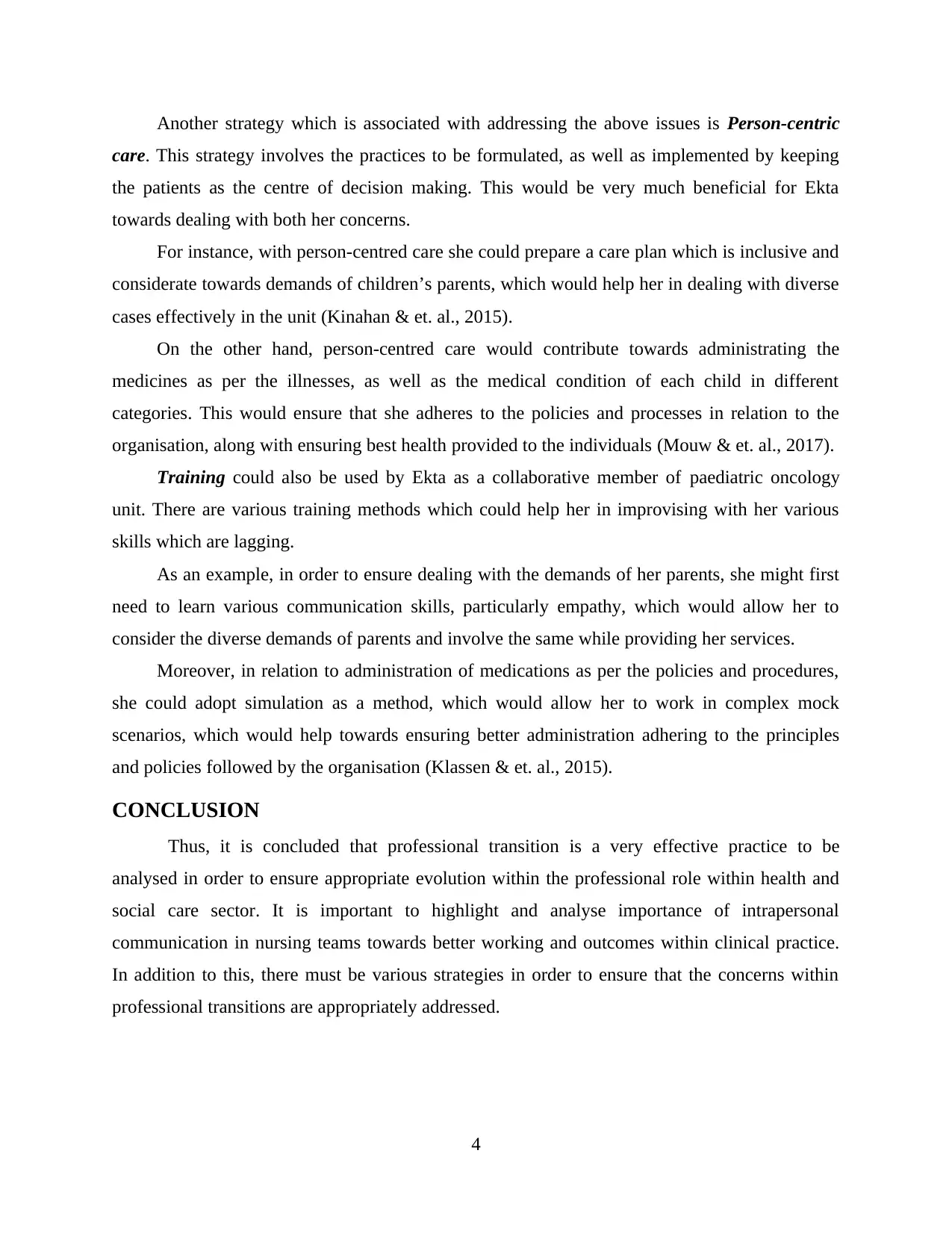
Another strategy which is associated with addressing the above issues is Person-centric
care. This strategy involves the practices to be formulated, as well as implemented by keeping
the patients as the centre of decision making. This would be very much beneficial for Ekta
towards dealing with both her concerns.
For instance, with person-centred care she could prepare a care plan which is inclusive and
considerate towards demands of children’s parents, which would help her in dealing with diverse
cases effectively in the unit (Kinahan & et. al., 2015).
On the other hand, person-centred care would contribute towards administrating the
medicines as per the illnesses, as well as the medical condition of each child in different
categories. This would ensure that she adheres to the policies and processes in relation to the
organisation, along with ensuring best health provided to the individuals (Mouw & et. al., 2017).
Training could also be used by Ekta as a collaborative member of paediatric oncology
unit. There are various training methods which could help her in improvising with her various
skills which are lagging.
As an example, in order to ensure dealing with the demands of her parents, she might first
need to learn various communication skills, particularly empathy, which would allow her to
consider the diverse demands of parents and involve the same while providing her services.
Moreover, in relation to administration of medications as per the policies and procedures,
she could adopt simulation as a method, which would allow her to work in complex mock
scenarios, which would help towards ensuring better administration adhering to the principles
and policies followed by the organisation (Klassen & et. al., 2015).
CONCLUSION
Thus, it is concluded that professional transition is a very effective practice to be
analysed in order to ensure appropriate evolution within the professional role within health and
social care sector. It is important to highlight and analyse importance of intrapersonal
communication in nursing teams towards better working and outcomes within clinical practice.
In addition to this, there must be various strategies in order to ensure that the concerns within
professional transitions are appropriately addressed.
4
care. This strategy involves the practices to be formulated, as well as implemented by keeping
the patients as the centre of decision making. This would be very much beneficial for Ekta
towards dealing with both her concerns.
For instance, with person-centred care she could prepare a care plan which is inclusive and
considerate towards demands of children’s parents, which would help her in dealing with diverse
cases effectively in the unit (Kinahan & et. al., 2015).
On the other hand, person-centred care would contribute towards administrating the
medicines as per the illnesses, as well as the medical condition of each child in different
categories. This would ensure that she adheres to the policies and processes in relation to the
organisation, along with ensuring best health provided to the individuals (Mouw & et. al., 2017).
Training could also be used by Ekta as a collaborative member of paediatric oncology
unit. There are various training methods which could help her in improvising with her various
skills which are lagging.
As an example, in order to ensure dealing with the demands of her parents, she might first
need to learn various communication skills, particularly empathy, which would allow her to
consider the diverse demands of parents and involve the same while providing her services.
Moreover, in relation to administration of medications as per the policies and procedures,
she could adopt simulation as a method, which would allow her to work in complex mock
scenarios, which would help towards ensuring better administration adhering to the principles
and policies followed by the organisation (Klassen & et. al., 2015).
CONCLUSION
Thus, it is concluded that professional transition is a very effective practice to be
analysed in order to ensure appropriate evolution within the professional role within health and
social care sector. It is important to highlight and analyse importance of intrapersonal
communication in nursing teams towards better working and outcomes within clinical practice.
In addition to this, there must be various strategies in order to ensure that the concerns within
professional transitions are appropriately addressed.
4
⊘ This is a preview!⊘
Do you want full access?
Subscribe today to unlock all pages.

Trusted by 1+ million students worldwide
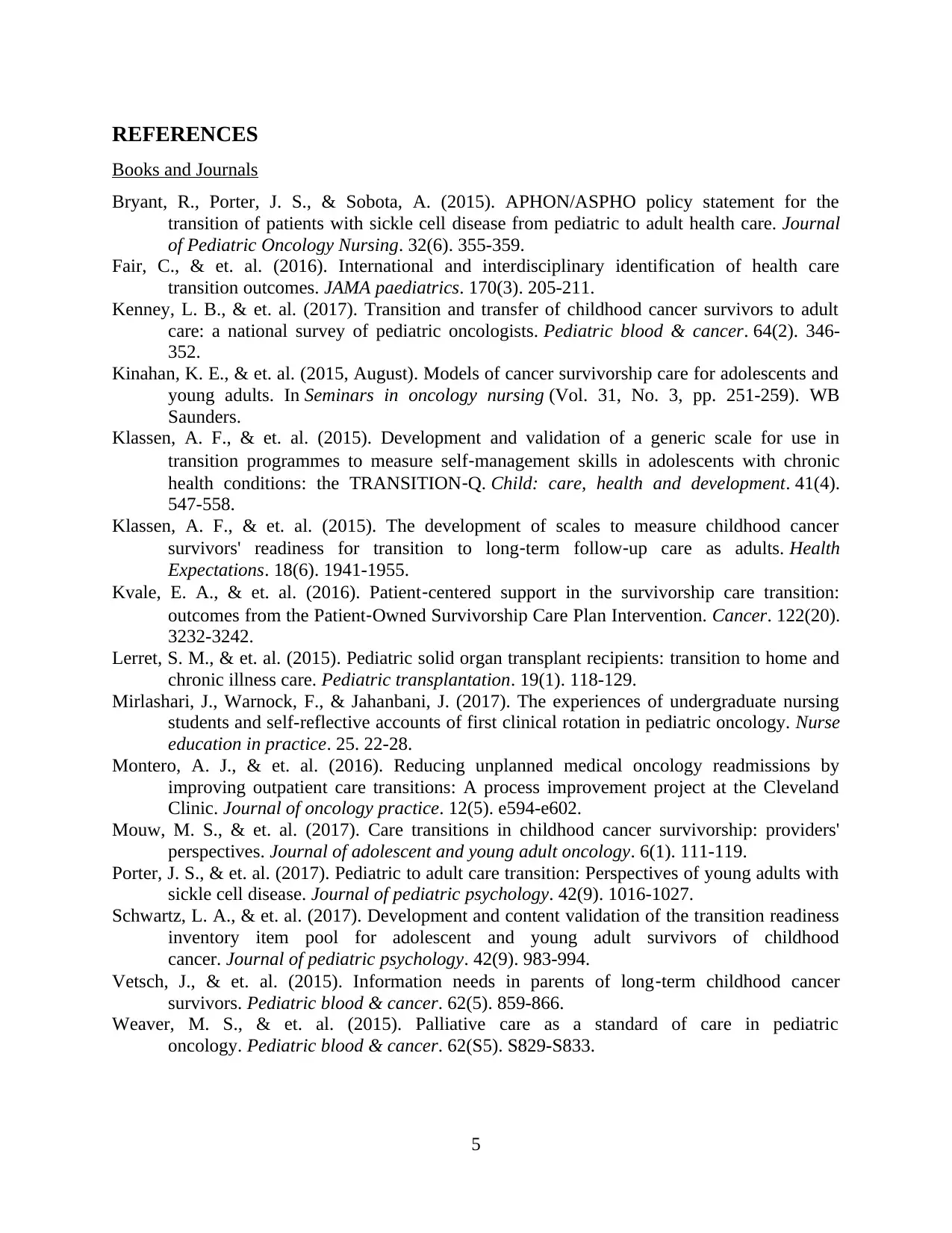
REFERENCES
Books and Journals
Bryant, R., Porter, J. S., & Sobota, A. (2015). APHON/ASPHO policy statement for the
transition of patients with sickle cell disease from pediatric to adult health care. Journal
of Pediatric Oncology Nursing. 32(6). 355-359.
Fair, C., & et. al. (2016). International and interdisciplinary identification of health care
transition outcomes. JAMA paediatrics. 170(3). 205-211.
Kenney, L. B., & et. al. (2017). Transition and transfer of childhood cancer survivors to adult
care: a national survey of pediatric oncologists. Pediatric blood & cancer. 64(2). 346-
352.
Kinahan, K. E., & et. al. (2015, August). Models of cancer survivorship care for adolescents and
young adults. In Seminars in oncology nursing (Vol. 31, No. 3, pp. 251-259). WB
Saunders.
Klassen, A. F., & et. al. (2015). Development and validation of a generic scale for use in
transition programmes to measure self‐management skills in adolescents with chronic
health conditions: the TRANSITION‐Q. Child: care, health and development. 41(4).
547-558.
Klassen, A. F., & et. al. (2015). The development of scales to measure childhood cancer
survivors' readiness for transition to long‐term follow‐up care as adults. Health
Expectations. 18(6). 1941-1955.
Kvale, E. A., & et. al. (2016). Patient‐centered support in the survivorship care transition:
outcomes from the Patient‐Owned Survivorship Care Plan Intervention. Cancer. 122(20).
3232-3242.
Lerret, S. M., & et. al. (2015). Pediatric solid organ transplant recipients: transition to home and
chronic illness care. Pediatric transplantation. 19(1). 118-129.
Mirlashari, J., Warnock, F., & Jahanbani, J. (2017). The experiences of undergraduate nursing
students and self-reflective accounts of first clinical rotation in pediatric oncology. Nurse
education in practice. 25. 22-28.
Montero, A. J., & et. al. (2016). Reducing unplanned medical oncology readmissions by
improving outpatient care transitions: A process improvement project at the Cleveland
Clinic. Journal of oncology practice. 12(5). e594-e602.
Mouw, M. S., & et. al. (2017). Care transitions in childhood cancer survivorship: providers'
perspectives. Journal of adolescent and young adult oncology. 6(1). 111-119.
Porter, J. S., & et. al. (2017). Pediatric to adult care transition: Perspectives of young adults with
sickle cell disease. Journal of pediatric psychology. 42(9). 1016-1027.
Schwartz, L. A., & et. al. (2017). Development and content validation of the transition readiness
inventory item pool for adolescent and young adult survivors of childhood
cancer. Journal of pediatric psychology. 42(9). 983-994.
Vetsch, J., & et. al. (2015). Information needs in parents of long‐term childhood cancer
survivors. Pediatric blood & cancer. 62(5). 859-866.
Weaver, M. S., & et. al. (2015). Palliative care as a standard of care in pediatric
oncology. Pediatric blood & cancer. 62(S5). S829-S833.
5
Books and Journals
Bryant, R., Porter, J. S., & Sobota, A. (2015). APHON/ASPHO policy statement for the
transition of patients with sickle cell disease from pediatric to adult health care. Journal
of Pediatric Oncology Nursing. 32(6). 355-359.
Fair, C., & et. al. (2016). International and interdisciplinary identification of health care
transition outcomes. JAMA paediatrics. 170(3). 205-211.
Kenney, L. B., & et. al. (2017). Transition and transfer of childhood cancer survivors to adult
care: a national survey of pediatric oncologists. Pediatric blood & cancer. 64(2). 346-
352.
Kinahan, K. E., & et. al. (2015, August). Models of cancer survivorship care for adolescents and
young adults. In Seminars in oncology nursing (Vol. 31, No. 3, pp. 251-259). WB
Saunders.
Klassen, A. F., & et. al. (2015). Development and validation of a generic scale for use in
transition programmes to measure self‐management skills in adolescents with chronic
health conditions: the TRANSITION‐Q. Child: care, health and development. 41(4).
547-558.
Klassen, A. F., & et. al. (2015). The development of scales to measure childhood cancer
survivors' readiness for transition to long‐term follow‐up care as adults. Health
Expectations. 18(6). 1941-1955.
Kvale, E. A., & et. al. (2016). Patient‐centered support in the survivorship care transition:
outcomes from the Patient‐Owned Survivorship Care Plan Intervention. Cancer. 122(20).
3232-3242.
Lerret, S. M., & et. al. (2015). Pediatric solid organ transplant recipients: transition to home and
chronic illness care. Pediatric transplantation. 19(1). 118-129.
Mirlashari, J., Warnock, F., & Jahanbani, J. (2017). The experiences of undergraduate nursing
students and self-reflective accounts of first clinical rotation in pediatric oncology. Nurse
education in practice. 25. 22-28.
Montero, A. J., & et. al. (2016). Reducing unplanned medical oncology readmissions by
improving outpatient care transitions: A process improvement project at the Cleveland
Clinic. Journal of oncology practice. 12(5). e594-e602.
Mouw, M. S., & et. al. (2017). Care transitions in childhood cancer survivorship: providers'
perspectives. Journal of adolescent and young adult oncology. 6(1). 111-119.
Porter, J. S., & et. al. (2017). Pediatric to adult care transition: Perspectives of young adults with
sickle cell disease. Journal of pediatric psychology. 42(9). 1016-1027.
Schwartz, L. A., & et. al. (2017). Development and content validation of the transition readiness
inventory item pool for adolescent and young adult survivors of childhood
cancer. Journal of pediatric psychology. 42(9). 983-994.
Vetsch, J., & et. al. (2015). Information needs in parents of long‐term childhood cancer
survivors. Pediatric blood & cancer. 62(5). 859-866.
Weaver, M. S., & et. al. (2015). Palliative care as a standard of care in pediatric
oncology. Pediatric blood & cancer. 62(S5). S829-S833.
5
1 out of 7
Related Documents
Your All-in-One AI-Powered Toolkit for Academic Success.
+13062052269
info@desklib.com
Available 24*7 on WhatsApp / Email
![[object Object]](/_next/static/media/star-bottom.7253800d.svg)
Unlock your academic potential
Copyright © 2020–2026 A2Z Services. All Rights Reserved. Developed and managed by ZUCOL.





